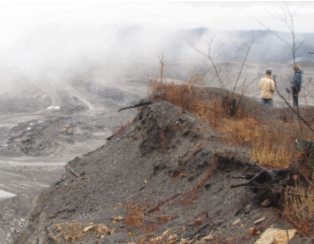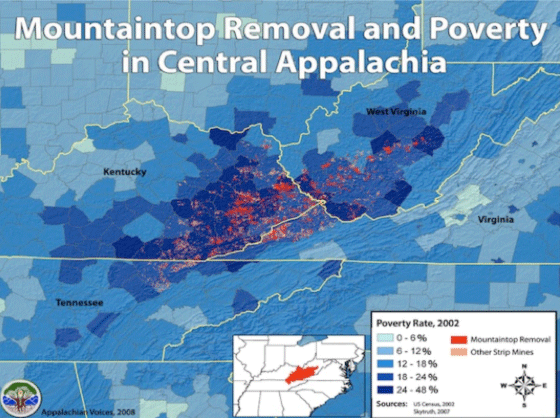The Good, The Bad and The Ugly of Mountaintop Removal Coal Southern Alliance for Clean Energy
 Those fighting for the mountains and those who make the mountains their home have won a crucial victory. On Thursday, November 15, 2012, Patriot Coal became the first U.S. operator to stop large-scale mountaintop removal (MTR) coal mining. Patriot Coal is known for destructive large-scale mining projects in Central Appalachia, an area of the country that has known its share of struggle. The plight of those affected by mountaintop removal coal mining has helped to highlight the fact that, more often than not, historically disadvantaged communities are the same communities most impacted by companies with harmful environmental practices. There are few places in the nation where that sad, simple fact is less obvious than in the Southeastern United States.
Those fighting for the mountains and those who make the mountains their home have won a crucial victory. On Thursday, November 15, 2012, Patriot Coal became the first U.S. operator to stop large-scale mountaintop removal (MTR) coal mining. Patriot Coal is known for destructive large-scale mining projects in Central Appalachia, an area of the country that has known its share of struggle. The plight of those affected by mountaintop removal coal mining has helped to highlight the fact that, more often than not, historically disadvantaged communities are the same communities most impacted by companies with harmful environmental practices. There are few places in the nation where that sad, simple fact is less obvious than in the Southeastern United States.
The historic action taken by Patriot Coal stems from pollution lawsuits filed by the Sierra Club, the Ohio Valley Environmental Coalition and the West Virginia Highlands Conservancy. In exchange for its agreement to phase out mountaintop removal mining efforts, Patriot was given more time to install selenium treatment systems at several mines. Selenium is a toxic metal and can cause severe health effects in humans, such an neurological issues, if it finds its way into drinking water supplies.
Although a significant amount of mountaintop removal occurs outside of SACE's regional focus area, that coal is shipped all over the country and burned in coal plants located in the Southeast - many of which need to retire. In its 2010 report, "Burning Coal, Burning Cash," the Union of Concerned Scientists ranked the states that import the most coal from other regions where the coal is mined. Southeastern states dominate the top of the ranks, importing staggering amounts of coal, much of it from MTR.
- Topping the list was Georgia, which imported $2.6 billion of coal to supply its coal fired plants.
- North Carolina was right behind Georgia, spending $2.3 billion on coal imports.
- Florida came in fourth on the list with $1.6 billion.
- Alabama was sixth with $1.4 billion.
- Tennessee came in eighth with $1.2 billion spent on coal imports.
It's clear that coal imports are big business in the Southeast and it should be even clearer that we, as Southerners, need to be ever mindful of how the coal we import is produced - particularly because mountaintop removal shares something in common with a long list of other destructive environmental practices in that it primarily impacts those communities that have been historically marginalized.
 The connection between Southeastern Coal Plants and Mountaintop Removal (2009) from ilovemountains.org
The connection between Southeastern Coal Plants and Mountaintop Removal (2009) from ilovemountains.org
Across the nation, communities of color and economically disadvantaged communities are dealing with a disproportionally high amount of threats to their health and safety caused by environmentally destructive operations. Whether it's toxic wastewaters flowing on tribal lands or the destruction of entire chains of industry in the Gulf Coast region, when disadvantaged communities are forced to deal with the effects of pollution it complicates an already tenuous situation.
When a community's drinking water supply is contaminated, many in these economically underprivileged areas cannot afford to buy clean water from the store and are forced to use unhealthy water. When the effects of breathing in toxic air cause members of these communities to need medical help, many do not have access to effective health care. As evidenced by reports created by Coal River Mountain Watch, those living around mountaintop removal sites experience cancer rates 5% higher than others living in Appalachia. Overall, coal pollution in Appalachia causes $75 billion a year in public health costs. For a region plagued by poverty, this cost is far too much to bear.
This type of disparate harm is not unique to mountaintop removal and Appalachia. A 2009 University of Massachusetts report, “Justice in the Air: Tracking Pollution from America’s Industries and Companies to Our States, Cities, and Neighborhoods” found that Fortune 500 and other industrial companies are not equal opportunity polluters. People of color and poor people generally live on the “wrong side of the environmental tracks.” The study found that pollution is unevenly distributed within states, with some of the most dramatic differences between the share of people of color in the total human health risk from industrial air toxics occurring in the South.
For example, Tennessee had the highest disparities in exposure, with people of color comprising 43% of those in the state exposed to toxic air and water despite only comprising 21% of the total state population. Alabama and South Carolina have similarly alarming statistics for the amount of people of color affected by pollution. Birmingham, Alabama carries the distinction of being the metropolitan area with the greatest disproportionate impact on people of color - people of color bore 65% of the health risk while comprising only 34% of the population, a 31% discrepancy. Memphis, TN has an almost equally disheartening story, with 70% of the health risks born by people of color, who make up only 48.1% of the population. The South, it seems, has a lot of work to do to reduce sources of environmental pollution and ensure that harms from such pollution are not disproportionately placed in communities of color.
As we continue to fight against dirty forms of energy and advocate for cleaner, renewable sources of electric generation, we must also stand up for those who suffer the disproportionate effects from toxic air and dirty water. Let us join in the chorus and magnify our voices so that no one is left in the wake of environmental destruction. And let us hope that we are one step closer to a world free of mountaintop removal coal mining.



The views and opinions expressed in this post are those of the author(s) and do not necessarily reflect those of MomsRising.org.
MomsRising.org strongly encourages our readers to post comments in response to blog posts. We value diversity of opinions and perspectives. Our goals for this space are to be educational, thought-provoking, and respectful. So we actively moderate comments and we reserve the right to edit or remove comments that undermine these goals. Thanks!